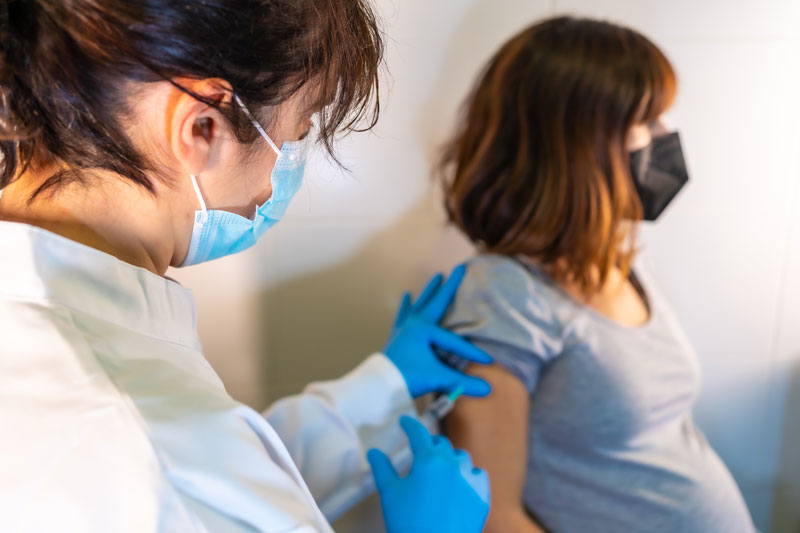COVID-19 vaccines during pregnancy and lactation period
Pregnancy is considered a very serious risk factor for COVID-19, in some cases leading to complications such as pneumonia, hospital or ICU admission, death of the pregnant woman, premature birth or even loss of the baby.
A crucial means of preventing these complications is vaccination. Vaccination against COVID-19 is recommended for people who are pregnant, regardless of the week of gestation, and for those who are breastfeeding. There is no need to wait more or less weeks of gestation; the earlier you decide to get vaccinated, the sooner you will reduce the risks.

What vaccines are used for pregnant women?
Based on available scientific evidence, persons who are pregnant or breastfeeding should preferably be administered mRNA vaccines (Pfizer or Moderna).
Time interval between administration of COVID-19 vaccine and other vaccines
If other vaccines have to be administered for other reasons, COVID vaccination should be separated from other vaccines by at least one week.
Reminder dose for pregnant women
The Regional Ministry of Health and Families recommends that pregnant women over 18 years of age who have been previously vaccinated with the full vaccination schedule should be given a booster dose of mRNA vaccine (which can be Moderna or Pfizer).
Requirements for this booster dose
Fully vaccinated pregnant women over 18 years of age, regardless of risk factors and gestational age. A booster dose is recommended if they meet any of the following criteria:
- If the complete regimen was with Pzifer or Moderna vaccines, at least 5 months must have passed since the last dose.
- If the full course was with AstraZeneca or Janssen vaccines, at least 3 months must have passed since the last dose.
- If the full course was with one dose of AstraZeneca and one dose of mRNA (Pfizer or Moderna), at least 5 months must have passed since the last dose.
And if you have passed COVID-19, what to do?
If you were infected before or after the first or second dose of vaccine, the booster dose should be given. But if you have recently passed COVID-19, you can receive the booster dose if there has been a 4-week interval since infection. However, an interval of 5 months after diagnosis is recommended.
Special Cases
There are special cases that must be taken into account when receiving the booster dose:
- People vaccinated with a single dose of Pfizer: these will receive a second dose of mRNA vaccine (Moderna or Pfizer) if at least 21 days have passed. After this second vaccination, they would receive the second dose of mRNA vaccine (Moderna or Pfizer) after at least 5 months.
- People vaccinated with a single dose of Moderna: will receive a second dose of mRNA vaccine (Moderna or Pfizer) if at least 28 days have passed. After this second vaccination, they will receive the booster dose of mRNA vaccine (Moderna or Pfizer) after at least 5 months.
- People vaccinated with a single dose of AstraZeneca: will receive a second dose of mRNA vaccine (Moderna or Pfizer) if at least 8 weeks have passed. After this second vaccination, they will receive the booster dose of mRNA vaccine (Moderna or Pfizer) after at least 5 months.
Why administer this reminder dose?
In addition to the reduction in natural immunity due to the passage of time since the end of the full regimen, there is also the decrease in physiological immunity that accompanies pregnancy.
Currently, booster doses are approved for women over 18 years of age. For women under the age of 18, booster doses are not yet approved.
Bibliography
- Shimabukuro TT, Kim SY, Myers TR, et al. Preliminary Findings of mRNA Covid-19 Vaccine Safety in Pregnant Persons. N Engl J Med 2021; 384:2273-2282. DOI: 10.11/NEJMoa2104983.
- Zauche LH, Wallace B, Smoots AN, et al. Receipt of mRNA COVID-19 vaccines and risk of spontaneous abortions. New Engl J Med Published online September 8, 2021; DOI: 10.11/NEJMc2113891
- Kharbanda EO, Haapata J, DeSilva M, et al. Spontaneous Abortion Following COVID-19 Vaccination During Pregnancy. JAMA. Published online September 8, 2021. doi:10.1/jama.2 021.15
- Goldshtein I, Nevo D, Steinberg DM, et al. Association Between BNT162b2 Vaccination and Incidence of SARS-CoV-2 Infection in Pregnant Women. JAMA. Published online July 12, 2021. doi:10.1/jama.2 021.11
- Dagan N, Barda N, Biron-Shental T, et al. Effectiveness of the BNT162b2 mRNA COVID-19 vaccine in pregnancy. Nat Med. Published online September 7, 2021. https://doi.org/10.1/s41591-021-01490-8ícono de sitio externo
- Gray KJ, Bordt EA, Atyeo C, et al. Coronavirus disease 2019 vaccine response in pregnant and lactating women: a cohort study. Am J Obstet Gynecol. Published online March 25, 2021. DOI:https://doi.org/10.1/j.ajog.2021.03.023ícono de sitio externo
- Perl SH, Uzan-Yulzari A, Klainer H, et al. SARS-CoV-2–Specific Antibodies in Breast Milk After COVID-19 Vaccination of Breastfeeding Women. 2021;325(19):2013–2014. doi:10.1/jama.2 021.58
- Kelly JC, Carter EB, Raghuraman N, et al. Anti-severe acute respiratory syndrome coronavirus 2 antibodies induced in breast milk after Pfizer-BioNTech/BNT162b2 vaccination. Am J Obstet Gynecol. 2021;225(1):101-103. https://doi.org/10.1/j.ajog.2021.03.031ícono de sitio externo
- Jakuszko K, Kościelska-Kasprzak K, Żabińska M, et al. Immune Response to Vaccination against COVID-19 in Breastfeeding Health Workers. Vaccines. 2021; 9(6):663. https://doi.org/10.34/vaccines9060663 ícono de sitio externo
